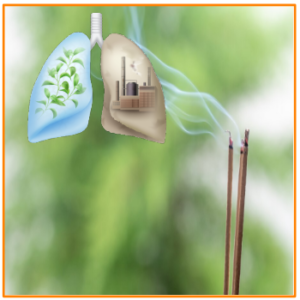Problems With Modern Agarbattis Including Ingredients Like DEP – Diethyl Phthalate
Agarbattis, or incense sticks, have been an integral part of cultural and religious practices for centuries. Traditionally, these fragrant sticks were prepared from natural ingredients like wood powders, resins, herbs, and essential oils. However, with tech advancements and changes in consumer preferences, modern agarbatti manufacturing has seen the incorporation of different synthetic compounds into their ingredients. Though this may enhance certain aspects of incense, it also raises significant concerns about health, environment, and sustainability.
What is Diethyl Phthalate (DEP)?
 One of the synthetic compounds used in modern agarbattis is Diethyl Phthalate (DEP). Diethyl Phthalate is a chemical compound primarily used as a plasticizer to increase the flexibility of plastics. It has a wide range of applications, including in cosmetics, personal care products, and fragrances.
One of the synthetic compounds used in modern agarbattis is Diethyl Phthalate (DEP). Diethyl Phthalate is a chemical compound primarily used as a plasticizer to increase the flexibility of plastics. It has a wide range of applications, including in cosmetics, personal care products, and fragrances.
This chemical is largely used in manufacturing perfumery compounds. Incense sticks. Further, it is also used as a fixative in manufacturing perfumes, attars, etc. DEP plasticizer is also used in the processing of Cellulose Acetate. The chemical is also used as a denaturant for Ethyl Alcohol.
In agarbatti manufacturing, DEP is often used as a binder to hold together the various ingredients and ensure a longer burning time. Acting as a fragrance evaporation retardant, DEP makes fragrances long-lasting, by releasing the aroma slowly during combustion.
 Health concerns of DEP
Health concerns of DEP
One of the major concerns surrounding DEP is its potential impact on human health. Phthalates, including DEP, are known to be endocrine disruptors, meaning they can interfere with the hormonal systems in living organisms. Studies have indicated that exposure to phthalates may be linked to adverse reproductive and developmental effects, including disruptions in hormone balance and reproductive organ development. As per research, DEP has caused death in animals when given a very high dose orally. However, brief oral exposures to less quantity caused no harmful effects.
Moreover, phthalates like DEP are not chemically bound to the products they are used in, which means they can easily leak into the environment and result in human exposure. In the context of agarbattis, this raises concerns about inhalation exposure. Incense sticks with DEP when burned, release particles and chemicals into the air, which likely get inhaled by individuals. This could potentially lead to respiratory irritation and long-term health risks, especially for those regularly exposed to agarbatti smoke.
Environmental impact of DEP
Apart from health concerns, the use of DEP in modern agarbattis also has impacts on the environment. DEP is not biodegradable and can endure in the environment for a long time. When incense sticks with DEP are burned, the chemical is released into the air and eventually settles in soil and water bodies. This can contribute to pollution and negatively impact ecosystems. Furthermore, the production of DEP itself involves chemical processes that can generate waste and emissions, contributing to pollution at various stages of its lifecycle.
What is Dipropylene Glycol (DPG)?
Dipropylene Glycol (DPG) is another ingredient popularly used in processing modern agarbattis. It is a colorless and nearly odorless liquid solvent with a high boiling point. However, DPG is comparatively less toxic than DEP. It is used as a cutting agent to dilute fragrances and essential oils. DPG is commonly used in making incense. This chemical allows the fragrance to bind to the stick or cone and creates slow-burning incense.
The need to explore alternatives
Agarbattis hold deep cultural and spiritual significance for many communities around the world. Incense sticks are often used in religious rituals, meditation, and as a means to purify the surroundings. However, the shift towards using synthetic compounds like DEP in manufacturing incense sticks could potentially raise ethical concerns for individuals who place great value on using natural and pure ingredients in their spiritual practices.
Given the conditions and impacts on living beings and the environment, it is essential to explore safer alternatives to DEP. Manufacturers are increasingly experimenting with natural binders and carriers that do not pose the same risks as DEP. These alternatives may include natural resins, gums, and plant-based materials that can achieve similar binding and fragrance-carrying effects without negative consequences.
Additionally, some experts and enthusiasts advocate the return to traditional methods of incense-making, which rely solely on natural ingredients. This not only aligns with the cultural and spiritual aspects of agarbatti use but also addresses the concerns related to synthetic additives.
